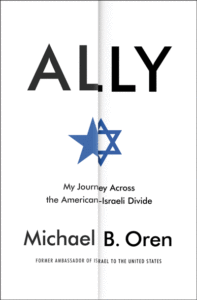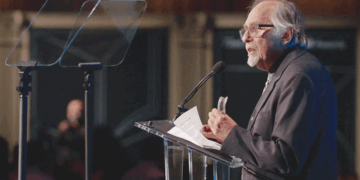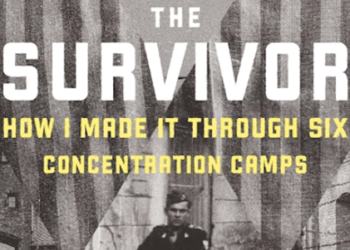Ally: My Journey Across the American-Israeli Divide, by Michael Oren, Random House, 412 pages, $30
Reviewed by NEAL GENDLER
From all the fuss, you might think that Michael Oren’s new book is a ranting bill of indictment of President Barack Obama. It’s not.
Ally is a calm, fascinating account of Oren’s hectic, sometimes frustrating, fulfilling mid-2009 to late 2013 as Israel’s ambassador to the United States. He both praises and criticizes Obama and administration officials, suggesting that Obama usually does the right things for Israel but sometimes says the wrong things.
So, too, can Prime Minister Netanyahu, says Oren, who warned that speaking to Congress about Iran was likely to “exacerbate our differences with the White House.” Among those was discovering that America secretly talked with Iran for seven months without telling the ally most threatened, violating a longstanding practice of “no surprises.”
Oren, a Princeton Ph.D., Middle East historian, and now Knesset member, says Obama is dangerously wrong about Iran.

Obama got off on the wrong foot with Israel, with a 2009 Mideast trip skipping Israel; a speech in Cairo linking Israel’s legitimacy to the Shoah, not Jews’ 3,000-year relationship with their homeland, and by suggesting to Jewish leaders a need for “daylight” between America and Israel.
Other presidents have had spats with Israel, but Oren calls such a suggestion — later denied — new and harmful: “A friend who stands by his friends on some issues but not on others is, in Middle Eastern eyes, not really a friend.”
Oren says Obama consistently declares Israel’s right to defend itself and supports U.S. funding for Israel’s anti-missile systems but forbade Israel to attack Iran’s nuclear plants. And the evening that Oren sought help during Israel’s 2010 forest fires, Obama immediately told personal aide Reggie Love: “Get Israel whatever it needs.”
Oren says: “The Carmel [fire] disaster further confirmed my initial assessment that the president, contrary to common conservative belief, was not anti-Israel. On the contrary. He was intensely supportive of a specific version of Israel — the Israel of refuge and innovations.
“But the Israel he cared about was also the Israel whose interests he believed he understood better than its own citizens and better than the leaders they chose.”
He says Obama and Netanyahu both believe that they’re the smartest men in the room and in “the power of oratory.” Ally calls Netanyahu “part commando, part politico and thoroughly predatory” with “an Old Testament temper.”
Much of the controversy comes from opinion pieces Oren wrote before the book came out. To review only the book: Ally is easy to read, typographically pleasing, and has maps, color photos, an index and pages identifying prominent characters. I saw no allegation that Obama has abandoned Israel.
Ally combines autobiography, memoir and analysis. Born Michael Bornstein, Oren grew up in New Jersey with “severe learning disabilities” and a leg brace. His poetry elevated him into advanced classes, leading to Columbia.
At 15, Oren spent a life-shaping summer as a kibbutz volunteer. In 1979, he moved to Israel, becoming a paratrooper serving in the 1982 Lebanon war. His books about the 1967 war and its effects and a history of America in the Middle East were hits.
Oren is a respected historian; it’s hard to believe — or disappointing to think — he invented things, as some claim. Two people talking alone, unrecorded, leave no way to tell whose version is accurate, if either. People unhappy at seeing their words in print often claim they were quoted out of context. (Sometimes they’re right.) Less often, they deny them; Oren gives an example of a politician being caught.
He’s been ridiculed for theorizing that Obama’s views about Islam were shaped by childhood rejection from two Muslim fathers. Well, historians so theorize, if usually about people long dead.
Oren lacked diplomatic experience or training, but he had the credentials for trying to explain Israelis and Americans to each other.
“Israelis have difficulty understanding America’s missionizing zeal” and belief it was created for humanity’s benefit, Oren says. “The notion that the [Mideast] region secretly longs for American-style freedom is simply incomprehensible.”
He criticizes American Jews and says that “walking the partisan fissure” between them “often felt like a high-wire act, and a wobbly one.” He spoke extensively, including on hostile campuses, and had unconventional friendships, among them Minnesota’s Rep. Keith Ellison, Congress’ first Muslim.
Ally debunks the story that Obama once left Netanyahu to go upstairs for a family dinner. He says that “exactingly civil in public, American officials, behind the scenes, often revel in four-letter words;” examples abound.
Sometimes, Obama’s words can be just right, Oren says, quoting Obama’s talk to 2,000 college students in Jerusalem. Obama said Jews’ “dream of true freedom finally found its full expression in the Zionist idea… to be a free people in your homeland.” Those who deny Israel’s right to exist, he said, “might as well reject the earth beneath them and the sky above, because Israel is not going anywhere.”
Agree with Oren or not, you should read this book.
***
Neal Gendler is a Minneapolis writer and editor.
(American Jewish World, 7.17.15)




















Comments 0